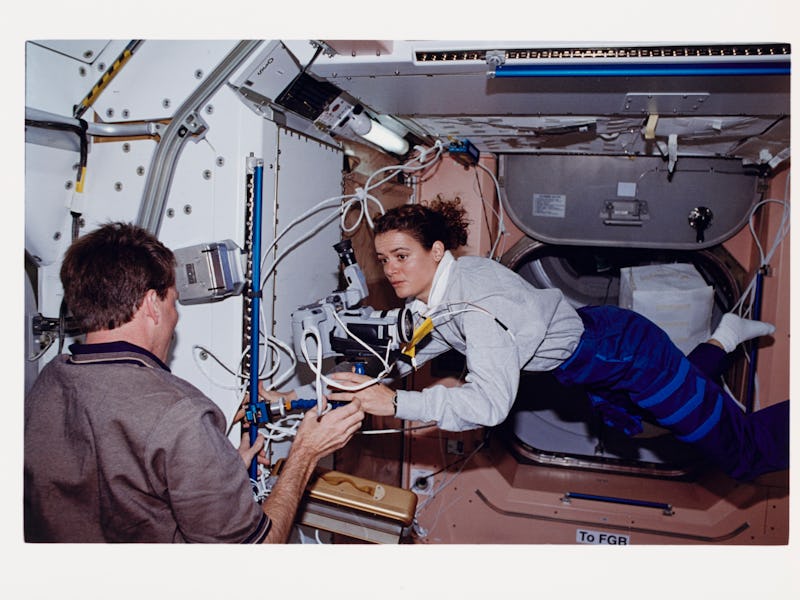Here's why space messes up your body
Little is known about the true extent of space health conditions.

Thanksgiving marks the birthday of the late Norbert Wiener, the mathematician and philosopher remembered for Cybernetics, his 1948 book that laid the groundwork for everything from artificial intelligence to how we interact with our smartphones. A child prodigy born in Missouri in 1894, he contributed to America's technical efforts in both World Wars and eventually began to focus on how to find information amidst the noise.
His development led to the Wiener filter, which today helps eliminate blur from our smartphone cameras. And Cybernetics, which its publisher notes is "as philosophical as it is technical," remains as prescient as ever in predicting our modern world. As The Atlantic noted in 2014, Wiener was an eccentric genius "whose time may have finally come (again)."
Our question of the week is about the holidays, which are now fully underway: What's your best memory of technology and the holidays? It could be a cool gift you or someone else got, or a time that technology came through in a pinch and made the holidays that much sweeter. Send us an email at newsletter@inverse.com and we'll publish our favorite responses!
This is an adapted version of the Inverse Daily newsletter for November 26, 2020. Subscribe for free and earn rewards for reading every day in your inbox.
Start the fire — SpaceX Starship: Watch incredible static fire ahead of 20-kilometer jump
Starship, SpaceX's rocket designed to send humans to Mars and beyond, could reach all-new heights next week.
On Tuesday, Space.com reported the Starship "SN8" prototype completed a static test fire at 6:23 p.m. Eastern at SpaceX's Texas facility. This was the fourth such test for the prototype; it is a procedure held before a launch in which the engines are fired but the vehicle is held in place.
The successful fire is another step toward Starship's biggest "hop test" yet.
What comes next for Starship? →
More like this:
Bucky Dent — Brain study shows why sports create especially powerful memories
Sports memories are sticky. Critical moments within the flow of the game can become etched in our memory even beyond buzzer-beaters and Hail Marys.
According to new research, this is because these events happen to delight the brain as much as they delight our inner rabid fan.
In a study of 20 undergraduate basketball fans, a team of Princeton University scientists found that surprise plays a key role in defining memories of a sporting event. Very dramatic games punctuated with surprise tap into a process in the brain that allows us to forge powerful memories, the team discovered.
Here's why you know more sports trivia than birthdays→
More like this:
Euro Musk — Elon Musk teases Tesla cars beyond Cybertruck and Roadster
Elon Musk is "excited" about designing original electric cars that could come in new form factors, the Tesla CEO said Tuesday.
In a live-streamed interview during the three-day European Conference on Batteries, subsequently shared by YouTube user Christian Baumann, Musk was asked about plans to design original vehicles at the company's Giga Shanghai and under-construction Giga Berlin facilities.
Could Elon Musk be thinking small? →
More like this:
Coming soon ...
Can work help equal out society? It's nice to think so, but science is doubtful. Coming soon on Inverse, a look at the so-called workplace meritocracy, if it even exists, and how the workplace might turn into a place where our social inequalities start to actually balance out.
Stay safe — 5 tips for staying Covid-safe this winter
The US Centers for Disease Control and Prevention recommends people stay home for the holidays. But commercial airlines are seeing a steep rise in flights. If you are committed to traveling this winter, here are five steps you can take to mitigate risks.
If you've gotta travel, travel smart →
More like this:
Boldy go — Scientists identify common source behind changes in astronauts' health
For more than 50 years, humans have been fascinated by the idea of exploring the cosmos, sending astronauts to the Moon and the International Space Station in low-Earth orbit.
But all those space journeys come at a cost. The microgravity environment appears to take a toll on the human body, affecting astronauts' brains, hearts, muscle and bone mass, and vision. But because so few people have been to space, little is known about the true extent of these worrying symptoms or what drives them in the body.
To try to tease out what exactly is going on in astronauts' bodies, more than 200 scientists pooled their efforts and their data to create the largest set of space-related biological data ever produced. Together, they identified one common thread behind all the changes taking place in the human body as a result of time in space — mitochondrial dysfunction.
"That wasn’t really on my radar, but it connects a lot of these things together." →
More like this:
- This is how much radiation astronauts will be exposed to on the Moon every day
- Astronauts experience these common, Earth-like symptoms in space
And that's it for Inverse Daily! If you're looking for more, make sure to check out the best action movie of 2020 on streaming.
Thank you for reading! Follow me on Twitter if you want, where I tweet too much.